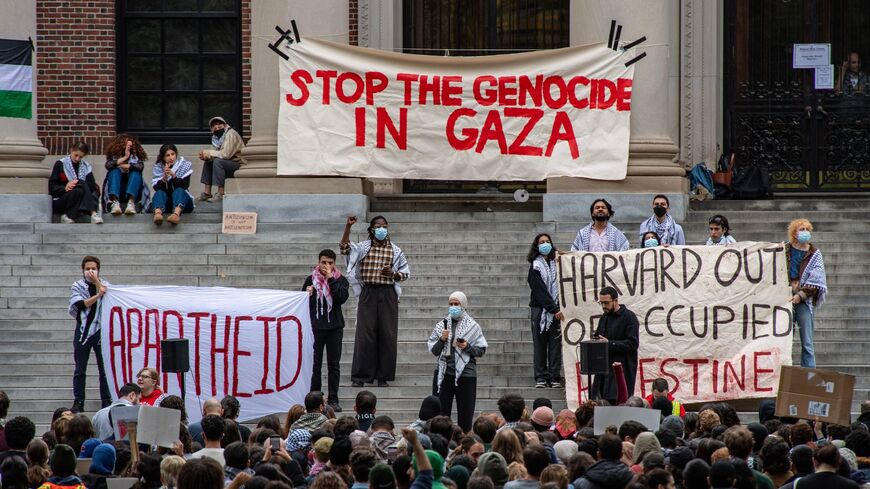Egyptian comedian Bassem Youssef no longer on X: What we know
The exiled comic has been a vocal critic of Israel, highlighting the plight of the Palestinians during the Gaza war but has recently been accused of antisemitism.

Egyptian comedian Bassem Youssef said on Tuesday that his account on X was not removed by the social media giant and vowed to continue posting content on other platforms.
The account of the prominent comedian with over 11 million followers on X vanished from the platform Monday evening, leaving no clear explanation for its disappearance.
“No, my X account wasn’t taken down by X and I don’t wish to falsely victimize myself using this,” said Youssef on Instagram.
What happened
Youssef's X account, @byoussef, became inaccessible around 5:00 p.m. ET on Monday. By Tuesday evening, the account's web page displayed the message, "This account doesn't exist."
The disappearance prompted speculation on the social media site that Youssef had been suspended. In his post on Instagram, Youssef alluded to “safety issues” related to his family as to why his X account is gone without elaborating further.
“When safety issues concerning my loved ones are alleviated I might consider coming back,” he said.
Youssef added that he will continue to post on Instagram, Facebook and TikTok, where he has a combined following of more than 15 million users.
“I wish to deal with this away from media,” he said.
Who is Youssef?
Youssef, 50, is an Egyptian-American comedian. Originally a heart surgeon, he came to prominence after the 2011 Arab Spring protests in Egypt with his satirical show "Al Bernameg,” Arabic for “The Program.” He mocked a variety of Egyptian political figures on the show, including former President Mohammed Morsi, a member of the Muslim Brotherhood.
American comedian Jon Stewart had Youssef on his show in 2012, helping make Youssef known to a US audience.
The Morsi government issued an arrest warrant for Youssef in March 2013.
Morsi was ousted in July of that year in what was widely described as a coup d’etat. Youssef defended the move, writing in Al-Arabiya the following month, “I am very glad with the outcome of the June 30 protests, and with the overthrow of President Mohammad Mursi.”
Censorship of Youssef in Egypt continued after the ouster of Morsi, however, and his show was canceled by the private network CBC in November of 2013, the state-owned news outlet Al-Ahram reported at the time.
Youssef left Egypt in November of 2014 after a court ruled that he had to pay a $10 million penalty related to his content. He moved to the United States with his wife and daughter after fleeing his home country, according to a 2017 CNN report.
Outspoken on Gaza
Youssef returned to the spotlight after the Gaza war broke out. He harshly criticized Israel’s treatment of Palestinians during an October interview with TalkTV’s Piers Morgan. Youssef pushed back against the accusation that civilians are dying in Gaza because Hamas is allegedly using them as human shields.
“If we agree that for the 14,000 casualties — I mean, who's counting — are human shields, does that mean that every single one of those civilians was standing, obscuring a military target behind them? Because that's a lot of weapons. Hamas is packing.”
Youssef recounted to millions of viewers that his wife, Hala Diab, has family in Gaza trapped in the conflict.
“The example is a powerful illustration of the broader point he makes about the value, or lack thereof, of Palestinian lives,” wrote Shaheen regarding Youssef’s comment on the value of Palestinian life.
Youssef argued that the higher number of Palestinians dying from Israeli bombardment demonstrated that their lives are seen as worthless.
More than 40,000 Palestinians have been killed in the war, according to the Health Ministry in Gaza. More than 1,110 people were killed in Israel during the Oct. 7 attack, per authorities there.
Youssef has criticized Hamas since the start of the war, telling Middle East Eye in February, “I am absolutely no fan of Hamas.” He has also expressed doubt about accusations regarding the group's conduct on Oct. 7. In an April interview with podcaster Lex Fridman, Youssef dismissed what he described as reports of “rape” and “decapitated babies.”
“Then I started kind of looking at the news a little bit, and then I started seeing people coming on the shows and saying things that I know, as an Arab, as a Muslim, as someone from that region, that it’s not true.”
The New York Times, the Guardian and other news outlets have reported on evidence of sexual violence carried out by the perpetrators of the Oct. 7 attack. The claim of babies being decapitated during the assault has never been confirmed.
Youssef and spokespeople for X did not immediately respond to Al-Monitor's request for comment.
Accusations of antisemitism
Youssef’s comments on Jews after the start of the Gaza war have drawn accusations of antisemitism. In a late July interview with Youssef, YouTube host Theo Von claimed that Jewish friends of his say “the media is mostly run by Jewish folks.”
“It is. All of the corporates, all the CEOs,” said Youssef in response.
Israeli commentator Hen Mazzig described Youssef’s remarks as “anti-Jewish” in a post on X earlier this month.
In the same interview, Youssef slammed the Antisemitism Awareness Act of 2023, which passed in the House in May, saying the legislation holds that “any criticism to Israel will be counted as antisemitic.”
The bill calls for the US Department of Education to adopt the International Holocaust Remembrance Alliance's definition of antisemitism when investigating potential civil rights violations. The IHRA does not hold that all criticism of Israel is antisemitic but includes examples of Israel-related antisemitism in its text.
In a January interview with controversial YouTuber Patrick Bet-David, Youssef falsely claimed that DNA testing is illegal in Israel and accused the Israeli government of “kidnapping” Yemeni children in 1950 “in order to instill Semitic DNA in their population.”
The Israeli government brought thousands of Yemeni Jews to the country in the late 1940s and early 1950s following antisemitic attacks in Yemen.
In a Monday post on X shortly before his account disappeared, Youssef called accusations of antisemitism a “fear tactic.”
“Are you still scared to be called an antisemite by those Zionists? Vote and tell me in the comments,” he said.








